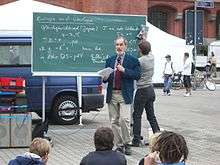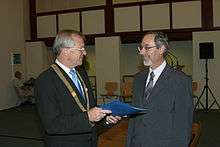Eckehard Schöll
Eckehard Schöll (born 6 February 1951 in Stuttgart, Germany) is a German physicist and mathematician as well as a Professor of theoretical physics at the Technical University of Berlin. He is an expert in the field of nonlinear dynamics and head of the group Nonlinear dynamics and control.[1] His work pertains to research in the fields of mathematics and physics, particularly semiconductor physics, neurodynamics and bifurcation theory. His latest research is also related to topics in biology and the social sciences, e.g. simulation of the dynamics in socioeconomic or neuronal networks.[2] He is one of the forerunners into the research of chimera states.

Eckehard Schöll is the author of over 500 publications in scientific journals,[3] three books (Nonequilibrium Phase Transitions in Semiconductors (Springer 1987), The Physics of Instabilities in Solid State Electron Devices (Plenum Press, New York, 1992), and Nonlinear Spatio-Temporal Dynamics and Chaos in Semiconductors (Cambridge University Press 2001)) as well as editor of several books.[4] His Hirsch index is 59 (as of May 2017) and his Einstein number is 5.[5]
Life and career

Since 1989 Eckehard Schöll is Hochschulprofessor at the Technical University of Berlin where to date he has supervised 100 Diplom-, Master- und Bachelor thesis, 30 PhD thesis und 2 habilitations. He studied physics at the University of Tübingen (Diplom 1976) and graduated with a PhD in mathematics in 1978 from the University of Southampton (UK, doctoral advisor P. T. Landsberg). He completed a Dr. rer. nat. in 1981 under the supervision of Friedrich Schlögl [6] (Genealogy] von Eckehard Schöll). He was a visiting assistant professor at the Wayne State University in Detroit, USA (1983-1984) and afterwards a guest scientist at the University of Florida, USA (1985). He finished is habilitation in 1986. He has been involved in several collaborative research centers and since 2011 he is the head of the collaborative research center SFB 910 of the Deutsche Forschungsgemeinschaft (DFG) with the topic Control of Self-Organizing Nonlinear Systems.[7] Eckehard Schöll is involved with the Studienstiftung des deutschen Volkes, and part of the election committee of the Fulbright Program.
Eckehard Schöll is married with two children and has one grandchild.
Awards and distinctions

Eckehard Schöll was scholar of Studienstiftung des deutschen Volkes between 1971 und 1978. In 1997 he was awarded champion of teaching from TU Berlin for his well structured and informative lectures.[8] In 2000 he received a Fulbright Senior Scholarship Award (Duke University, USA), as well as a Visiting Professorship der London Mathematical Society in 2004. In 2017 he was awarded an honorary doctorate of the Saratov State University, Russia.
Conferences Being an active member of the scientific community, Eckehard Schöll has been involved in the organization of several international scientific conferences [9]
- Short Thematic Program on Delay Differential Equations, Toronto 2015,
- Control of Self-Organizing Nonlinear Systems, Warnemünde 2014,
- Delayed Complex Systems, Palma de Mallorca 2012
- Delayed Complex Systems, Dresden 2009
- Local conference director of the 72., 76., and 79.DPG-Spring Meeting of the condensed matter section in Berlin
Works
- Control of Self-Organizing Nonlinear Systems (Springer, 2016)
- Handbook of Chaos Control (Wiley-VCH, Weinheim 2008).
- Nonlinear Spatio-Temporal Dynamics and Chaos in Semiconductors (Cambridge University Press, Cambridge, 2001).
- Theory of Transport Properties of Semiconductor Nanostructures (Chapman and Hall, London 1998).
- Nonequilibrium Phase Transitions in Semiconductors - Self-Organization Induced by Generation and Recombination Processes (Springer, Berlin, Heidelberg, New York, Tokyo 1987).[10]
Main research
- Dynamics of networks, synchronization patterns and Chimera-states
- Chaos and noise in dynamical systems
- Analysis of dynamical systems with time delay and the control thereof.
- Nonlinear dynamics of semiconductor lasers
- Nonlinear carrier transport in semiconductor nanosstructures
- Self organization, growth kinetics and Monte-Carlo-simulations
References
- "AG Nichtlineare Dynamik und Kontrolle: AG Schöll". Itp.tu-berlin.de. 2012-09-20. Retrieved 2016-02-11.
- Schöll, Eckehard (2010). "Neural control: Chaos control sets the pace". Nature Physics. 6 (3): 161–162. Bibcode:2010NatPh...6..161S. doi:10.1038/nphys1611.
- "AG Nichtlineare Dynamik und Kontrolle: Veröffentlichungen". Itp.tu-berlin.de. 2011-12-09. Retrieved 2016-02-11.
- "AG Nichtlineare Dynamik und Kontrolle: Books". Itp.tu-berlin.de. Retrieved 2016-02-11.
- "AG Nichtlineare Dynamik und Kontrolle: Scientific genealogy and Einstein number". Itp.tu-berlin.de. Retrieved 2016-02-11.
- "AG Nichtlineare Dynamik und Kontrolle: Arbeitsgruppenleiter". Itp.tu-berlin.de. Retrieved 2016-02-11.
- "SFB910: Sonderforschungsbereich 910". Itp.tu-berlin.de. Retrieved 2016-02-11.
- "TU Berlin - Medieninformation Nr. 245 - 10. November 1997". Archiv.pressestelle.tu-berlin.de. Retrieved 2016-02-11.
- "AG Nichtlineare Dynamik und Kontrolle: CV". Itp.tu-berlin.de. Retrieved 2016-02-11.
- "AG Nichtlineare Dynamik und Kontrolle: Veröffentlichungen". Itp.tu-berlin.de. 2011-12-09. Retrieved 2016-02-11.